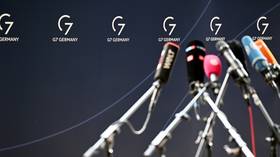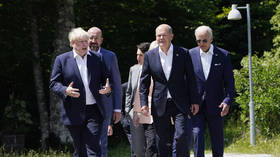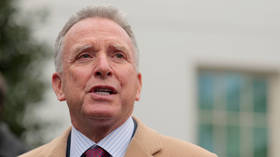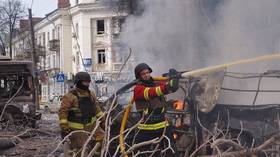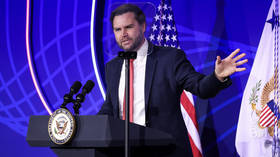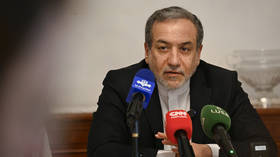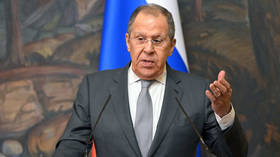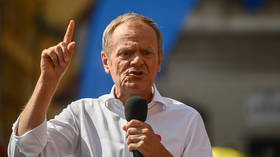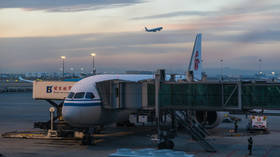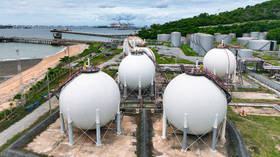German state-broadcaster questions G7 summit’s worth
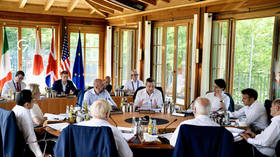
This year’s G7 summit, which is being held at Germany’s Elmau castle – a luxury hotel in Bavaria – cost taxpayers hundreds of thousands of euros, the German state broadcaster ARD has reported while questioning the worth of the event.
The gathering is an informal two-day meeting of the leaders of the seven largest Western economies – the US, UK, Germany, France, Italy, Canada and Japan – during which a number of non-binding commitments are usually agreed.
Held between June 26 and 28, it cost €166 million ($175.7 million), according to ARD’s Tagesschau news service, which is provided by its Norddeutscher Rundfunk division in Hamburg.
This was some €30 million ($31.75 million) more than seven years ago, when the summit was also held at Elmau. The bulk of the expenses go toward policy security arrangements, which cost €147 million ($155.6 million) this time.
The summit's critics believe that this is over the top for a relatively short meeting that hardly allows the leaders to properly address the pressing international issues. “The costs are disproportionate,” Rolf von Hohenhau – the head of the Bavarian Taxpayers’ Association – insisted, back in 2015, when the summit ended up costing €135 million ($142.9 million). “Elmau doesn't make any sense,” he added at the time.
Some critics argue it is just a tremendously expensive PR stunt, with little real value behind it. “People meet for nice photos, the declarations are agreed beforehand,” Benjamin Russ, a spokesman for the ‘Stop G7 Elmau’ initiative, said in 2015. According to Russ, the leaders have just about 24 hours to discuss “difficult topics.” “No one can claim that a serious debate is possible” under such circumstances, he said, adding that “one does not have to spend up to €200 million for a few people to sleep in a luxury hotel.”
The proponents of the format point to the lack of informal meetings among leaders, where they can have discussions without being pressed into making certain decisions or reaching any particular agreements, Tagesschau explained. According to its report, the meetings have also often resulted in new trends emerging and have contributed to major agreements on the world stage, as happened at the previous meeting in Elmau back in 2015. At that time, the seven leaders made a significant contribution to the Paris Climate Agreement, which was struck just a few months after the G7 summit, the news service added.
Critics, however, argue that most declarations made during G7 meetings become irrelevant. “With between 300 and 400 individual commitments [made] at every meeting, many [of them] remain unfulfilled,” said Klaus Seitz, the head of the politics department at the ‘Brot fuer die Welt’ (‘Bread for the World’) development and relief NGO. All the strategies to combat global hunger adopted at G7 summits “have obviously failed,” Seitz told Tagesschau.
Another issue with the G7 format is that it does not involve so-called “up-and-coming emerging nations” such as Russia, India and China, the German media outlet says, adding that global economic problems can hardly be solved without them. The G20 summit, which brings together the 20 biggest economies from various corners of the world, is “more representative and has the remaining two UN Security Council members – Russia and China – on board,” Tagesschau added.
Local residents hardly seem happy with the meeting either, according to a report by Euronews. Many streets are cordoned off by the police and fences are erected in many places, scaring off tourists and disrupting people’s everyday lives, the media said.
Prior to the summit, thousands of police officers had been deployed to the Bavarian village and a ski resort, Garmisch-Partenkirchen, which is traditionally popular among tourists year-round. A local taxi driver told Euronews he had been left with no passengers during the meeting, and an elderly woman complained she could not even visit her sister living nearby due to street closures.
A restaurant owner from Garmisch-Partenkirchen told Euronews that life in the area has been disturbed for months because of a meeting that lasts only a few days. “You think it is only four days … No, we've had it since March and it probably won't stop until mid-August; all that nonsense; we only have the police [here], one doesn't feel well anymore. We don't have any more foreign [tourists],” he said.
